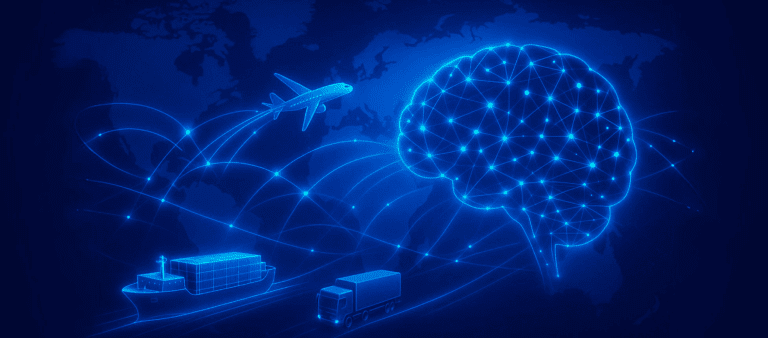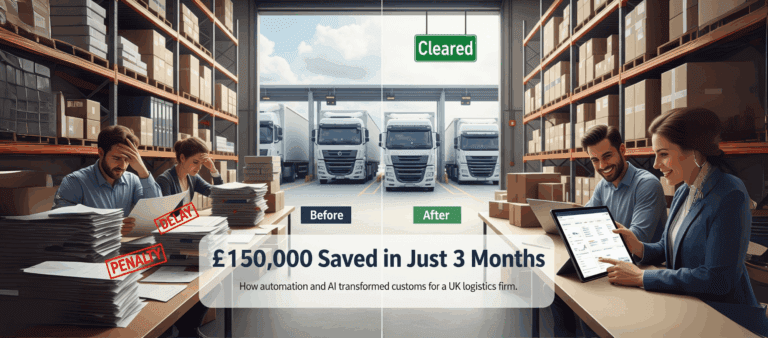Sort your ICS2 declarations in 90 seconds with AI
From 48% to 99.9% Accuracy: A Client’s Compliance Turnaround
- John Hall
- Customs Specialist at iCustoms.ai
For one UK-based freight forwarder, accuracy wasn’t just a KPI; it was the difference between smooth operations and weeks of disruption.
Before they adopted AI-powered customs technology, their customs declaration accuracy hovered around 48%. In practical terms, that meant roughly one in five shipments had a compliance error.
For a business moving hundreds of consignments each week, the cost was huge: delayed clearances, additional inspections, administrative rework, and the occasional penalty notice from HMRC.
“We thought we had a solid process, but the reality was that our team was spending more time fixing errors than processing new shipments,” said the company’s Operations Manager.
The challenge: The cost of inaccuracy in customs declarations
Trade compliance doesn’t let anything go unnoticed. A single wrong HS code can trigger an incorrect duty calculation, an inspection request, or even a seizure of goods. For this freight forwarder, the most common issues were:
HS code misclassification
With over 5000 tariff lines regularly in use and multiple product categories per shipment, product classification relied heavily on reference spreadsheets. Slight differences in the product description often led to misclassifications that customs caught during clearance.
“Two products could look identical, but a small material difference could change the HS code and duty rates completely. Getting it wrong was costing us dearly.”
Inconsistent data across documents
Even if the individual documents are accurate, there might be inconsistencies in data across various documents, such as commercial invoices, packing lists, and customs declarations.
For example, if your invoice says 900 units while the packing list says 1000, expect delays. Customs systems picked up these mismatches as red flags, prompting extra checks.
The strain of manual reviewing
Staff were manually reviewing hundreds of entries per day, copying and pasting from various systems. After hours of repetitive work, even experienced professionals would miss a missing consignee code or a typo in a country of origin.
Costly delays at ports
Each time customs queried a declaration, containers could sit at the port for 48–72 hours, incurring storage fees and frustrating customers awaiting urgent deliveries.
“Every delay meant difficult conversations with our clients. We weren’t just moving goods; we were moving their trust, and every day a shipment sat at the port, that trust was on the line.”
The turning point: Why they choose AI-powered accuracy
The company knew that merely process tweaks weren’t enough; they needed a systemic fix. They implemented iCustoms’ AI-powered trade compliance platform, designed specifically for high-volume customs declarations.
Here’s how iCustoms helped them climb from 48% to over 98% accuracy:
Automated HS code classification
Manually classifying products was a constant source of errors, especially when descriptions were vague, lengthy, or slightly different across documents.
With iCustoms, the AI tool (iClassification) analysed product descriptions, cross-referenced them with UK and international tariff databases, and compared them against the company’s historical shipment data.
It then suggested the most accurate HS code, complete with justification notes and source references, giving the compliance team confidence to approve quickly.
“We stopped spending hours scrolling through spreadsheets and trade databases; the AI gave us the right code and the proof to back it up,” said the Operations Manager.
Real-time data validation before submissions
Errors often slipped in because mismatched or incomplete data wasn’t spotted until after customs submission.
iCustoms fixed that by validating every field in real time, from consignee details to origin country codes, against customs rules and regulatory requirements.
If something looked suspicious, like a declared value too low for the product type, the system flagged it instantly. This meant issues were caught before customs saw them, preventing clearance delays altogether.
Intelligent document processing (IDP)
Before iCustoms, the team manually extracted shipment data from commercial invoices, packing lists, and certificates, a slow, error-prone process.
With Intelligent Document Processing, the system scanned and interpreted incoming trade documents automatically, pulling out key fields like quantities, weights, values, and product descriptions.
It also matched these against the declaration fields, flagging discrepancies before submission. This not only improved data accuracy but also cut document handling time by over 60%.
“We no longer have to manually dig through PDFs and spreadsheets; the system reads, checks, and fills in the details for us,” the Operations Manager explained.
AI-powered tax and duty calculators
Misjudging import duties or VAT can lead to costly underpayments, penalties, or overpayments that eat into profit margins.
iCustoms’ integrated tax and duty calculator (iCalculator) automatically applied the correct duty rates, VAT, and trade agreement benefits based on the HS code, origin, and destination of the goods.
Continuous learning from past errors
Every time customs raised a query, the AI logged the issue, learned from it, and updated its ruleset automatically.
Instead of repeating the same mistakes, the system became smarter with every shipment, eliminating recurring problems such as incorrect preferential origin declarations or tariff misalignments.
Seamless integration with existing systems
Before, data had to be copied manually from the freight management system into customs software, a prime opportunity for typos and missing fields.
iCustoms integrated directly with their ERP, freight, and documentation systems, creating a single source of truth. This meant zero re-keying and fewer opportunities for human error.
With these capabilities working together, their customs declaration accuracy shot up to 98% and continued climbing towards near-perfect levels as the AI kept learning.
The results
After six months, the transformation was measurable:
- Accuracy rate: Improved from 48% to 99.9% across thousands of declarations.
- Operational efficiency: Staff processing time per declaration was reduced by 65%.
- Customer trust: On-time delivery performance increased, leading to renewed contracts and new business referrals.
“The difference was night and day. Customs queries became rare, our staff stopped working late to fix issues, and our customers noticed the change immediately.”
Why this matters for every freight forwarder
Many freight forwarders underestimate the financial and reputational cost of small errors. A single declaration correction can require hours of back-and-forth with customs and cost hundreds in storage fees. Multiply that by dozens of errors per month, and the business impact is significant.
AI-powered accuracy offers a sustainable fix because it:
- Scales effortlessly with shipment volume without extra headcount
- Applies consistent logic to every declaration, every time
- Creates a digital audit trail to defend compliance decisions
Keeps up with regulation changes automatically; no manual updates needed
Wrapping up
This UK-based freight forwarder’s jump from 48% to 99.9% accuracy wasn’t a coincidence; it was the result of replacing reactive human-led checks with proactive AI-driven precision.
As their Operations Manager said, “I can’t imagine going back to the way we worked before. iCustoms gave us confidence and rebuilt client trust.”
You may also like:
Simplify Customs with our Powerful Customs Management Software
Automate declarations, track shipments, & ensure compliance.
About iCustoms
iCustoms is an all-in-one solution helping businesses automate customs processes more efficiently. With AI-powered and machine-learning capabilities, iCustoms is designed to streamline your all customs procedures in a few minutes, cut additional costs and save time.
Simplify Customs with our Powerful Customs Management Software
Automate declarations, track shipments, & ensure compliance.




